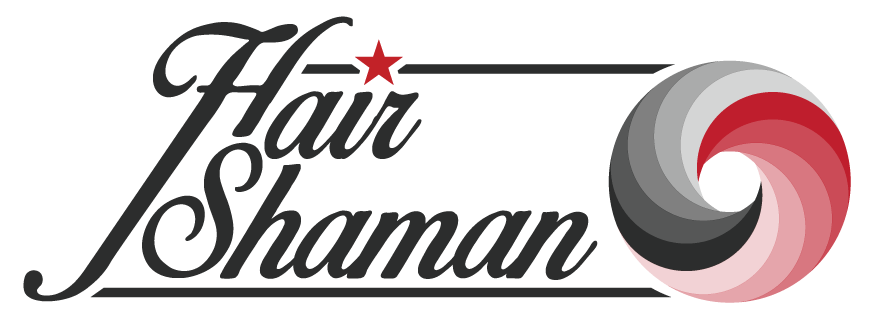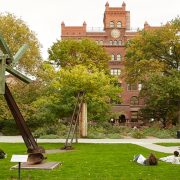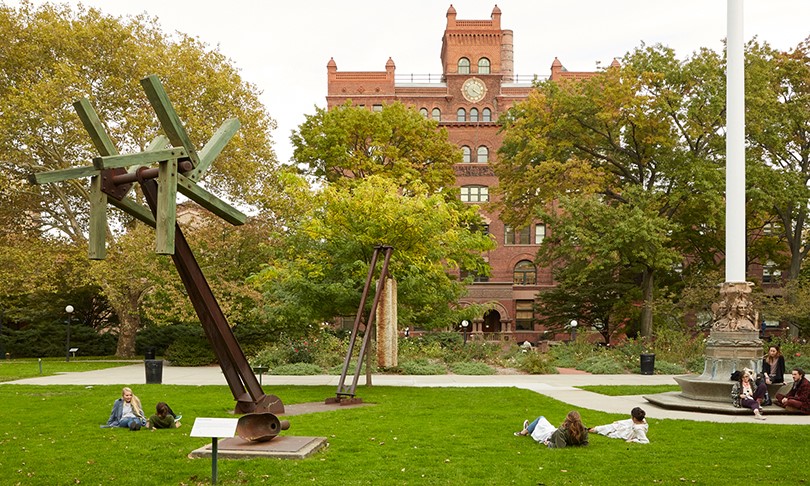Book 2: Chapter 9
Universe vs. The University
In January of 1964, the Escape Artist had made his last great escape and cut loose of the United States Navy forever. Even after leaving, I always remained grateful and always a member of the Navy at heart. I would always carry the lessons and experiences I’d picked up in the Mediterranean and places beyond it. Not re-enlisting meant I was a private citizen once again.
I’d made an initial go of it back home in Bristol, Connecticut and found it miserable – a dead-end. Washington had promise, but it fizzled with our invitation. Then, a friend of a friend brought me to New York City, Manhattan and surrounding boroughs.
I’d witnessed firsthand the bustle of midtown, the grime and crime of the battery, the highs and the lows of one of the greatest cities on Earth and I’d done it during one of the most tumultuous years in modern history. The heights of a political promise which broke with the new decade that dashed along with the young life of our president, John Fitzgerald Kennedy, at the end of 1963: a new and terrible low in American history.
So, I felt like in just the few short months I’d been back in the United States (not counting those boring few months in Norfolk, New Jersey), it was like I’d already endured the best and worst of the American Century, the wonder and the worry of the Atomic age.
I was twenty-one years old.
So, I turned my attention to my future and, just as crucial, my present. I’d been pulling down three jobs in the food service industry, including bartending and catering, but I knew that wasn’t where my future was. With bad tippers, abusive customers and shrewish broads, I didn’t think it was going to be my present for very much longer.
I’d had a shot at a movie studio job the day Kennedy was assassinated. I reached back out to the producer, but nobody was making any big business decisions that month, especially since the following month was Christmas. Once the year rolled over, life went on in show business without me and my calls were never returned. I’d no other choice than to look elsewhere.
I cast a pretty wide net. I knew the U.S. Navy would be true to its word and put me through college on the GI bill just about anywhere I wanted to go. There’d be some limits, but I wasn’t really thinking about Harvard anyway. I knew I needed some real-world skills to build a valuable career. I couldn’t go on spending the rest of my life being the Escape Artist, popping from one exotic location to the next… Unfortunately, I couldn’t become a professional tourist and make a living out of it.
I could have hit Boston University, University of California, Los Angeles, known even then as UCLA, or its rival, University of Southern California (USC). There were almost too many choices, so I started looking for other things to consider. Southern California would be best for weather, but the people were known to be a bit unstable. I wanted stability. Washington had been interesting, but it was more a political town than a college experience. Texas had several good universities, but I wasn’t interested in moving to Dallas.
I decided to take geography into account: The Northwest was gloomy; the Southwest too hot; the Midwest too flat and severe; the South too hot and humid; and the East coast prone to the worst of every season. It never failed to amaze me that this was where the Pilgrims managed to establish the original thirteen colonies. Los Angeles had earthquakes, the Midwest had tornadoes, Florida had alligators and mosquitoes that I heard were as big as your hand.
So I turned my attention away from where to study to what to study. I knew I had artistic impulses, but I also had commercial aspirations. I knew I wanted to be around people who were a little more colorful than I’d found in the Navy, less disciplined and more free-willing. That was the tenor of the changing times, after all. Even though I was fresh from the services, I was still young and ready to adapt back to civilian life. I was no lifer swabbie, just a free-spirited young man with the world at his feet and every opportunity within his grasp.
More and more, it was probably because I was in New York, I began to think about the fashion industry, clothes, hair and photography. There was money there, freedom, women, celebrities, good times and room for untold advancement. However, as far as fashion, I didn’t even need to check a mirror to know I didn’t have a stellar future as a model. Not that I was a bad-looking guy, but I wasn’t about to pass myself off as professionally gorgeous.
Then, maybe I thought photography or something similar would be better. I could draw and I always had a fairly good sense of framing and perspective. What was hair and makeup but a way to frame the face? A way to create a deliberate perspective despite whatever light or other distractions there may be?
I couldn’t deny that this was a world far different than the Navy. A lot of the men in the fashion industry would not have passed military muster. At least not at that time. At the end, what I wanted was something new, a different kind of community and those people weren’t the ones I was most interested in spending time with anyway.
New York was the American center of the fashion industry and could be closely compared to the European fashion hubs of London, Paris and Milan. By realizing this, my quest to finding my where fell right into place. The only decision I still had to make was to choose a school.
The Pratt Institute’s Brooklyn Campus was easy to get to. It was not exactly in the center of the best part of the city, but it had a leading faculty, a national reputation, and it could provide untold local contacts and opportunities. Plus, it was on the Navy’s dime.
I enrolled and bought my books, some new clothes and got down to business.
Pratt had a reasonably pretty campus, especially considering how urban the environment was. There were sizable patches of grassy, tree-strewn lawns, which became rarer the farther away you were from Central Park. Since it was basically an art institute, there were a good deal of statues around the campus. Some of them were of naked, crouching men and women staring thoughtfully into some imagined distance, while others were comprised of long and welded poles. There were astonishing monuments scattered throughout the campus. One of those monuments I can vividly remember was a patch of grass that housed beautiful, colorful pinwheels spinning idly in the breeze.
It felt so much like an outdoor museum and public garden that the campus attracted more than just the students and faculty. In the spring, I’d see some mothers sitting with their toddlers and some others pushing baby strollers; there were also people throwing tennis balls for their eager dogs to retrieve. It was almost like being back in a small town; all the comforting sights and sounds of bucolic Middle America, but without the endless drab, repetitive conversations, and faces every day, getting older and older as the years rolled on.
Yes, it was still New York, with the vibrancy, excitement and sophistication that it provided, but there was also the crime, the grit, the flat ugliness of the streets which made their way even onto that lovely little campus. Concrete walkways led students from one big red brick building to another. These squarely, unadorned and utilitarian structures could have been dorms, a high school, or even a federal prison when seen in the right light. Sadly, it would come to look more and more that way as my time there went on.
I took the basic freshman classes, Pratt’s version of general education: Design and Architecture, Art and Design, Illustration, Drawing, Graphic Design, Painting & Drawing. Suffice it to say, I did a fair amount of drawing.
I felt like I was just doing what everybody else was doing: working the system. If being in the Navy had taught me anything, and it had taught me a lot, one thing was that the system has its method and it cannot be questioned. One does as one is told and serves the system to have the system prevail.
Universities seemed to work pretty much the same way. Young people came in, slightly older people came out, all transformed into a slightly different thing which is of greater value to a society. The football jock would become a capable advertising executive. The young poet would be molded into something more useful, perhaps into an English teacher. The wanna-be Hollywood star would be a news anchor on some local channel.
So I didn’t question it. I simply worked as hard as I could, learned as much as I could, strove to do as best as I was physically able to. That was the training you get from the Navy: to refuse surrender and to work as hard as necessary to get the job done.
For me that meant an endless parade of chapters to read, sketches to do, painting to study; and then again, more books, more sketches, until my eyes burned and fingers bled; and until my fingers burned and my eyes bled.
The more I thought about it, the more it seemed that I was working myself too hard. I was there to enjoy my youth as much as to make something of my future. After all, I wasn’t about to get any younger. I took into account something else that my time in the Navy had taught me: one was never sure what was going to happen. I decided that a more strategic approach would be to focus less and let things just sort out on their own.
For all the time I spent seeming to float around Europe, I had always traveled with a goal, with purpose. I had applied myself to the best of my abilities at every turn, risking my life for the greater good where necessary. I wasn’t about to just start drifting through life, not after being where I’d been and seeing what I’d seen.
It was true that one couldn’t question the system, but it was also true that the system was made by the man to serve mankind. Every individual within that system had to know their place, their purpose, to take up that mantle to the very best of their ability, and to the very last of their resources. The system couldn’t function if the parts didn’t function properly on their own or if they failed to inter-work with the parts immediately around them. The system cannot allow confusion, variety or choice.
So, after a few months at Pratt, I became frustrated. It felt a lot like an additional year of high school. I’d always been an overachiever, but my teachers had discouraged me because that didn’t serve the system best. So they stifled me at an early age just to make their jobs easier, not realizing that they’d been overlooking the very central reason for their jobs to begin with! It discouraged me to see that things at Pratt were pretty similar. It was that same “keep your head down, do as you’re told, loose lips sink ships” mentality.
But this was an art school, where creative impulses should have been nurtured and encouraged, where a little bit of chaos should have been considered a good thing. I was an artist searching for my own voice, trying to see and present the world in my own way, but they just wanted to teach me to see the world the way they saw it, the way their clients saw it. Again, I was an artist, but they wanted me to be merely a practitioner, carrying on the same notions of form and function which had gone on for centuries before and would endure for centuries long after. If the human race managed to live that long, of course.
Learning wasn’t what had attracted me to the arts, to New York, to the United States. It was the land of the free and the home of the brave, but somehow at Pratt I felt like neither one. I felt like a caged dog, a rat in a maze or a cog on a wheel.
While being kept that way served the system well; in most cases, it could stifle the individual, their process of living and discovering things for themselves. How ironic, wasn’t that just what I’d left the Navy to do? Then it hit me: I’d simply traded serving one system for serving another and my quest to fulfill the individual that I was, live the life that I wanted to lead, was still frustratingly beyond my grasp. I was heading down the wrong path.
Yet I knew I hadn’t chosen poorly either. New York was the land of opportunity and I knew I had a future in one of its many glamor professions. My only wonder was whether or not Pratt was the way to go or if there wasn’t some other route to the same glorious destination.
Once the notion of leaving Pratt behind crept into my head, it was hard to ignore. I kept thinking about it more and more until I was no longer considering whether to leave, but where to go, how to get there and what to do thereafter.
These were the big questions of life for a young man of my age; in that city, in that year, or any man in any city on any year, really. As the six-month mark came up, I knew it was time for a change and I was beginning to have a pretty good idea of what shape that change might take.
I lost more than a few nights trying to sleep on it, getting cranky and irritated the more it plagued me. I asked myself, Why should I let this send me around the bend? Why do I need to go to an art school anyway? A college to learn how to draw the human hand? I can already do that!
And the more I thought about it, the more I was convinced…
Why should I even be going to a college or university at all? I’ve done three years in the United States Navy, I’ve traveled the world – that’s the best education a young man could ask for. If I need to read The Great Gatsby, I’ll just go ahead and read The Great Gatsby. I don’t need some snooty college professor to explain it to me and then grade me on how well I regurgitate his own opinions back to him! I sure don’t need some fraternity. After risking my life, the idea of kneeling before some punk so he could slap me on the ass with a wooden paddle and have to say, “Thank you, sir, may I have another?” just isn’t going to happen.
The word university is derived from the word universe, meaning that when you go to a university, you study all that there is to study, everything in the universe. Your education should really be, in a sense, universal, a student learns a little about everything and everything about a little, but I could already teach myself anything I needed to know. The knowledge of the universe was already mine for the taking with nothing more than a free public library card and a bit of time to do some reading.
Forget these professors, their systems and their preconceived notions of who I am, what I should think and feel, what I should do or create, what my life should be. They don’t know me and they never will.
They can do things their way, but I’ll be damned if I’m going to let them stop me from doing my own things, living my own life, my own way.
The term wasn’t over yet and the Navy was still paying my way, so I decided to stick it out until the end of the semester and make my next move then. I was anxious, imagining where I’d go and what I’d do, and as the timing got closer I couldn’t escape the nervous curl in my gut. The future was wide open, but so is a great jaw about to swallow its prey.
The days crept on, my future making its way toward me with patient mercilessness, but I kept working, did my best at Pratt. Just get through it, don’t back down.
Yeah, I know, my own voice answered back, but I hate being told what to do! After three years in the Navy, it’s enough!
Just a little while longer, I told myself, something big is waiting just around the corner.
I found it hard to believe, but I thought I’d give myself the benefit of the doubt. I’d been wrong before.
TO BE CONTINUED …




